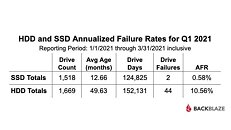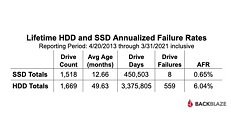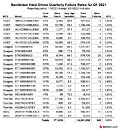Friday, May 7th 2021
SSDs More Reliable than HDDs: Backblaze Study
In the initial days of SSDs, some 11-odd years ago, SSDs were considered unreliable. They'd randomly fail on you, causing irrecoverable data loss. Gaming desktop users usually installed an HDD to go with the SSD in their builds, so they could take regular whole-disk images of the SSD onto the HDD; Microsoft even added a disk imaging feature with Windows 7. Since then, SSDs have come a long way with reliability, are now backed with longer warranties than HDDs, and high endurance. Notebook vendors are increasingly opting for SSDs as the sole storage device in their thin-and-light products. A Backblaze study reveals an interesting finding: SSDs are 21 times more reliable than HDDs.
Backblaze is popular for conducting regular actionable studies on storage device reliability in the enterprise segment, particularly dissecting how each brand of HDD and SSD fares in terms of drive failures or average failure rates (AFR). In a study covering Q1 2021 (January 1 to March 31), Backblaze finds that the AFR of HDDs across brands, stands at 10.56%. In the same period, SSDs across brands lodged an AFR of a stunning 0.58%. In other words, roughly 1 in 10 HDDs failed, compared to roughly 1 in 200 SSDs. Things get interesting when Backblaze looks all the way back to 2013, when it started studying drive reliability.With annualized failure rates studied between April 2013 and April 1, 2021, Backblaze finds that SSDs total 0.65% AFR, while HDDs do 6.04%. The relatively higher HDD failure rates are attributable to the fact that they have moving parts; pull more average age (before they need replacement), the fact that before they reach their manufacturer-rated endurance, SSDs are highly tolerant to electrical faults using capacitor banks, and the fact that HDD manufacturers have generally reduced the warranties on their drives after the HDD factory flooding incidents in 2012.
Source:
Tom's Hardware
Backblaze is popular for conducting regular actionable studies on storage device reliability in the enterprise segment, particularly dissecting how each brand of HDD and SSD fares in terms of drive failures or average failure rates (AFR). In a study covering Q1 2021 (January 1 to March 31), Backblaze finds that the AFR of HDDs across brands, stands at 10.56%. In the same period, SSDs across brands lodged an AFR of a stunning 0.58%. In other words, roughly 1 in 10 HDDs failed, compared to roughly 1 in 200 SSDs. Things get interesting when Backblaze looks all the way back to 2013, when it started studying drive reliability.With annualized failure rates studied between April 2013 and April 1, 2021, Backblaze finds that SSDs total 0.65% AFR, while HDDs do 6.04%. The relatively higher HDD failure rates are attributable to the fact that they have moving parts; pull more average age (before they need replacement), the fact that before they reach their manufacturer-rated endurance, SSDs are highly tolerant to electrical faults using capacitor banks, and the fact that HDD manufacturers have generally reduced the warranties on their drives after the HDD factory flooding incidents in 2012.



41 Comments on SSDs More Reliable than HDDs: Backblaze Study
Then I can replace my 3+4 TB media storage with SSD.
One of the Intel 80GB drives originally priced around $220 at the time is showing signs of quitting too. So to me they are doing a little better but nothing to get excited about.
At the same time under most circumstances the data from the HDD can be recovered.
You can tell me everything about backups, you don't have to, but absolute most people never create them and sometimes they create a single backup and then give up on them. Edit: I personally know a couple of people who've been burnt by not having backups more than once.
Lastly in developing/underdeveloped countries, SSDs continue to be super-expensive, unless you're OK with 128GB or data which nowadays is just too little - smartphones often more.
My latest (brand new, not used) PC purchase was a 500GB SSD. My media hoarding days are done.
Much better argument for HDDs would actually be for suitability as offline backup medium of choice, where HDDs have inherent edge due to data retention.
The first two or three generations of OCZ Vertex SSDs ... yes, that's another story, and "unreliable" is an understatement.
And I believe SSDs' MTBF overtook HDDs years ago. But it's nice to have a third party confirm that. Also, keep in mind SSDs will "fail" if left unpowered for some time. Keep that in mind if you want to use a SSD in an external enclosure or something like that.
For bonus points: who remembers "parking" HDD heads prior to shutting down?
It doesn't matter if you can then play with recovery or not, when you should've never put yourself in that situation to begin with.
Mind you SSD wear is likely highly workload dependent. Read only SSD drives are likely to last a lot longer than ones being constantly written to.
Edit : for the record, we have around 1000 computers, so it's half HDD, half SSD in the inventory. HDD are on average older than SSD since we only buy SSD for the last 2-3years, but we still had more HDD failure in the same lifespan than SSD.
Duh.
Unsalvageable? When SSD's "die" from wear don't they go into a read only mode...you can get your data, you just can't write to it anymore.
And old? I think I could go out and fire up my OCZ Vertex 3 240GB SSD based system (that's been off for a good 2 years) and it would work fine. That machine is a solid 10 years old and was on nearly 24/7 for a good 8 years.
The data is probably salvageable, but salvaging it is not straightforward.